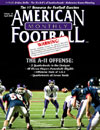AMERICAN FOOTBALL MONTHLY THE #1 RESOURCE FOR FOOTBALL COACHES
Article CategoriesAFM Magazine
|
An Official’s Guide To Controlling Pressure Situationsby: Rex LardnerEditor American Football Monthly © More from this issue Dr. John Laurie has been a high school teacher and administrator for over 45 years and has also been a high school and college football official for 40 years. He has officiated Kansas state high school football and basketball as well as serving as a referee in the Big 8 for 13 years and 11 years in the Big XII. Dr. Laurie also has officiated in 11 different bowl games and been, over the last decade, a regular contributor to American Football Monthly. His new book, Managing the Game: An Official’s Guide To Controlling Pressure Situations is the product of lessons learned during that near half century of both teaching and officiating. Dr. Laurie combines the worlds of management and sports through quotations that are applicable to both coaches and officials alike. Dr. Laurie and I spoke recently about his four decade....The full article can only be seen by subscribers. Subscribe today!
|
|
|||||||
| HOME |
MAGAZINE |
SUBSCRIBE | ONLINE COLUMNISTS | COACHING VIDEOS |
Copyright 2026, AmericanFootballMonthly.com
All Rights Reserved





